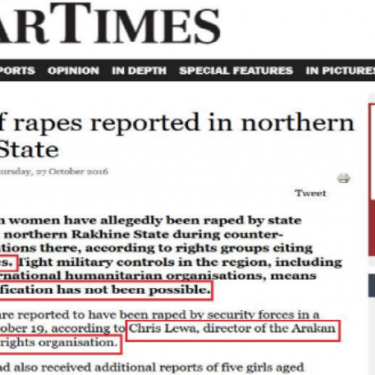RSF calls for probe into reporter’s dismissal by Myanmar Times

Reporters Without Borders (RSF) condemns British investigative reporter Fiona MacGregor’s dismissal by the Myanmar Times, an English-language daily based in Rangoon, over a story about the alleged rape of Rohingya women that upset Burma’s government. According to information obtained by RSF, the government’s meddling was not limited to one phone call from MOI.
The newspaper’s management fired MacGregor, its special investigations editor, on 31 October for supposedly breaching company policy and “uphold the paper’s reputation” and “damaged national reconciliation” through this story and other she had written. But the management declined to tell her exactly how she did this.
Her dismissal followed the publication of a story on 27 October about the alleged rape of dozens of women by soldiers during an operation in the northwestern state of Arakan, nowadays also known as Rakhine State, a restive region with a persecuted Muslim (Rohingya) minority.
Headlined “Dozens of rapes reported in northern Rakhine State”, the story reported numerous allegation of rape by security forces during military operations in the region, based on information gathered by human rights organizations in Myanmar. Reuters published a report the next day that seemed to confirm the information.
As reported by the Rangoon English-language weekly Frontier Myanmar, government officials lost no time in denouncing MacGregor’s story. President’s office spokesman Zaw Htay, for example, accused her of using “uncredible (sic)” sources in a Facebook post on the day her story appeared.
Former information minister Ye Htut went so far as to call for her to be charged under section 66(d) of the Telecommunications Law, which criminalizes online defamation and was used to arrest two senior Eleven Media Group journalists on 11 November.
Frontier Myanmar said the information ministry called the management of the Myanmar Times on 28 October, three days before her dismissal, to voice its displeasure with MacGregor’s reporting.
According to information obtained by RSF, the government’s meddling was not limited to this call. After her dismissal, the Myanmar Times human resources department contacted the information ministry in order to report that she had been fired. This was an extraordinary step for a newspaper to take.
Two Home Affairs Ministry officials led by former junta member Lt. Gen. Yaw Sew then went to the newspaper’s headquarters on 8 November to confirm that MacGregor really was no longer working there. RSF has been told that officials with other ministries also contacted the Myanmar Times about MacGregor. This brings to at least three the number of government bodies involved in her dismissal, which has been condemned by her colleagues at the newspaper.
“The government’s public comments and the date of Fiona MacGregor’s dismissal already left little doubt about government interference in the Myanmar Times’ affairs and it is confirmed by the information we have gathered, which clearly shows she was the victim of a political reprisal,” said Benjamin Ismail, the head of RSF’s Asia-Pacific desk.
“We call for a judicial investigation into this abuse of authority, in order to shed all possible light on the involvement of government officials in her dismissal, especially as her story and ensuing dismissal have come at a moment when the United Nations is expressing concern about possible crimes against humanity in Arakan.”
Ismail added: “At the same time, we think that it is not too late for the management of the Myanmar Times to reverse course. If it does not, and if it cannot justify her dismissal, it could be exposed to legal proceedings for violating Burma’s labour code.”
After the publication of MacGregor’s story, the staff of the Myanmar Times was banned from covering the military operations in Arakan pending directives from the information ministry on how the region and its Rohingya minority should be covered.
The president’s office announced on 16 November that it planned to lift the restrictions on journalists who want to cover the conflict in Arakan. Burmese media and NGOs that defend media freedom had denounced many curbs on reporting in the region.
The humanitarian crisis in Arakan and the fate of the Rohingyas continues to be one of Burma’s biggest taboos. For more than four years, RSF has been urging the authorities to lift the restrictions on access to the region, especially for journalists and foreign observers.
Despite significant progress from 2011 to 2014, the media freedom situation continues to be worrying in Burma, which is ranked 143rd out of 180 countries in RSF’s 2016 World Press Freedom Index. Aung San Suu Kyi’s National League for Democracy is now the governing party but former junta members continue to wield a great deal of political influence.



